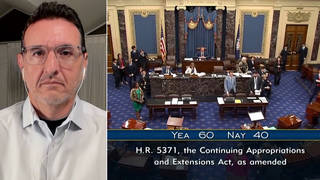HeadlinesJune 17, 2015
Bank of Greece Warns of “Painful Course” to Default Unless Deal Reached
Greece’s central bank has warned the country is on a “painful course” toward defaulting on its debts and dropping out of the eurozone. In a statement, the bank urged the Greek government and European creditors to reach a deal before Greece’s current bailout expires at the end of month. The Greek government has rejected European demands for further pension cuts. The Bank of Greece warns a default “would snowball into an uncontrollable crisis” and bring “deep recession, a dramatic decline in income levels, an exponential rise in unemployment and a collapse of all that the Greek economy has achieved over the years.”
Russia to Add 40 Ballistic Missiles to Nuclear Arsenal
Russia has announced plans to increase its nuclear arsenal. On Tuesday, Russian President Vladimir Putin said his government will add more than 40 new intercontinental ballistic missiles this year. Speaking in Brussels, NATO Secretary General Jens Stoltenberg accused Russia of nuclear “saber rattling.”
Jens Stoltenberg: “This nuclear saber rattling of Russia is unjustified, it’s destabilizing, and it’s dangerous. And this is something which we are addressing, and it’s also one of the reasons why we now are increasing the readiness and the preparedness of our forces. And we are responding by making sure that NATO also in the future is an alliance which provides deterrence and protection for all allies against any threat.”
The Russian move comes just days after it was revealed the Pentagon has drafted plans to store heavy weaponry including tanks in Eastern Europe for the first time since the end of the Cold War. The New York Times reports the plan would see enough weaponry for as many as 5,000 soldiers stored across several countries, from Estonia to Bulgaria and Poland. Russia has urged the U.S. to abandon the potential move, saying it would violate a 1997 agreement in which NATO pledged not to deploy a major troop force near Russian borders.
U.S. “Deeply Troubled” over Morsi Death Sentence in Egypt
Egypt has upheld the death sentence of ousted President Mohamed Morsi and dozens of others. The ruling came in the case of a 2011 prison break, one year before Morsi became Egypt’s first democratically elected leader. He was later ousted in a 2013 coup. Morsi’s attorneys say they will appeal. The ruling drew international criticism, including from the U.S., a key ally of the Egyptian regime. White House Press Secretary Josh Earnest said the U.S. is “deeply troubled” by Morsi’s sentence.
White House Press Secretary Josh Earnest: “We are deeply troubled by the politically motivated sentences that have been handed down against former President Morsi and several others by an Egyptian court today. We understand that Mr. Morsi’s attorneys intend — Mr. Morsi’s attorney intends to appeal the sentence. The United States has repeatedly raised concerned about the detention and sentencing of a variety of political figures in Egypt. And we are concerned that the proceedings have been conducted in a way that is not only contrary to universal values, but also damaging to the stability that all Egyptians deserve.”
In a report on Egypt quietly submitted to Congress last month, the Obama administration found “the overall trajectory for rights and democracy has been negative.” But the report concludes that despite a series of abuses and the undermining of a free society, Egypt is too important to U.S. interests for any cuts to annual military aid.
U.N. Panel: No Impunity for Sexual Abuses by Peacekeepers
A U.N. panel has recommended sweeping changes to the world body’s peacekeeping operations worldwide. The report comes amid revelations of sexual abuses and exploitation by U.N. forces in countries including Haiti, Liberia and the Central African Republic. Panel chair José Ramos-Horta said there must be zero tolerance for such crimes.
José Ramos-Horta: “This is what has to be very clear. You commit a barbarity, you have no protection whatsoever. You are subject to the laws of the country where you are operating. You know, he cannot hide under the United Nations’ roof.”
Senate Passes Long-Term Torture Ban
The Senate has passed a measure that would prevent a repeat of the U.S. torture program seen under President George W. Bush. The bipartisan amendment from Senators John McCain and Dianne Feinstein would extend President Obama’s torture ban to future administrations, outlawing any tactics not expressly included in the U.S. Army Field Manual. The measure passed by a vote of 78 to 21.
FDA Gives 3-Year Deadline to Phase Out Trans Fats
The Food and Drug Administration has announced a ban on all artificial trans fats. Food companies will have three years to phase out the use of partially hydrogenated oils, which have been linked to heart disease and thousands of deaths. Advocacy groups have welcomed the move but say the deadline should be earlier than three years.
GOP Hopeful Donald Trump on Mexican Immigrants: “They’re Rapists”
The real estate mogul and reality television personality Donald Trump has announced his bid for the Republican presidential nomination. In a rambling kickoff speech, Trump branded Mexican immigrants as criminals and rapists.
Donald Trump: “When Mexico sends its people, they’re not sending their best. They’re not sending you. They’re not sending you. They’re sending people that have lots of problems, and they’re bringing those problems with us. They’re bringing drugs. They’re bringing crime. They’re rapists. And some, I assume, are good people.”
In 1990, Donald Trump was sued for hiring at least 200 undocumented Polish workers to demolish a building to make way for Trump Tower, the massive skyscraper where he delivered his speech. In his comments, Trump also vowed to build a wall to stop Mexican immigration, as well as ISIL.
Donald Trump: “I would build a great wall. And nobody builds walls better than me, believe me. And I’ll build them very inexpensively. I will build a great, great wall on our southern border, and I will have Mexico pay for that wall, mark my words. Nobody would be tougher on ISIS than Donald Trump, nobody.”
If current polling numbers hold, Trump will likely make the cut for the first Republican presidential debate in August. Debate sponsor Fox News says it will take the top 10 candidates from the national polls. For his kickoff theme song, Trump chose Neil Young’s “Rockin’ in the Free World,” a song written as a partial critique of Republican policies in the 1980s. In a statement, Young said Trump is not authorized to use the song and said he supports Bernie Sanders for president.
U.K. Nuclear Whistleblower Gets Dishonorable Discharge
The whistleblower who exposed rampant security flaws on the submarines carrying Britain’s nuclear warheads has been dishonorably discharged from the British Royal Navy. Able Seaman William McNeilly detailed the lapses in an 18-page report for WikiLeaks, writing that it’s “harder to get into most nightclubs” than into sensitive areas of the nuclear base in Scotland. McNeilly turned himself in to police last month. In a new report posted online, McNeilly says all of the charges against him have been dropped, but he has been dishonorably discharged “on the claim that my sole aim was to discredit [the Navy’s] public image. It is shocking that some people in a military force can be more concerned about public image than public safety.”
Most popular
- 1
- 2
- 3
- 4
Non-commercial news needs your support
Please do your part today.











Media Options